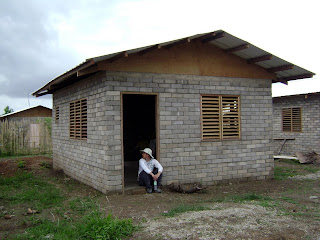When we were arranging the trip with the Habitat volunteers based in the Philippines, we asked if it might be possible for them to arrange a homestay for us with a local family. We were pretty excited when they responded almost immediately that they could do so with no problem.
We were a little more anxious when we found out, just after arriving, that we would be staying not with local people in the city, but with residents of the village. Don't get me wrong, we liked the villagers -- especially the kids -- perfectly well, but we weren't exactly sure what they thought of us. I haven't spent a lot of time in the really down-and-out places of my own country/-ies, but it seems to me that in the West (a loaded term that I am using quite intentionally), Horatio Algerism and the myth of the self-made man has come to mean that poverty is a stigma, an indication of bad luck at best and laziness at worst. Most poor people are embarrassed to be poor, and treat the wealthy with a sort of defiant unease.
Not exactly the recipe for a comfortable homestay.
There were also the more practical questions of whether they could afford to feed us, and whether we would be taking up too much room in their small houses.

As is perhaps usual, we underestimated the village and its people.

In the Philippines, and perhaps in other developing nations, poverty seemed to be viewed in a completely different light. Poverty simply is. Some people are poor, and some people are not, and it is just the way life is. I am sure that the poor would prefer to not be poor -- but because they do not assume that the wealthy are judging them, there is no need for embarrassment, defiance, or unease. We began to see and understand this during the week, as we worked with and talked to the soon-to-be-owners of the houses we were building. But it became crystal clear during the homestays.
Most families of the village have children; they are, after all, very Catholic (one family has 11!). So most of the homestay families came equipped with a bunch of kids who were only too eager to teach their overnight guest card games, learn origami, or color pictures. In one case, introduce the foreigner to the pet monkey in the backyard.
My family didn't have any kids -- or monkeys. I was placed with one of the pillars of the community, a woman so busy she doesn't notice that her husband's job as an island caretaker keeps him away from home five days a week, and her two sons aged 15 and 20.

I spent most of the evening with the 20-year-old, who just come home from college in Manila (they essentially skip junior high, so they go college at 16 and finish at 20) and was about to begin teaching theology to kids the same age as my students. This gave us plenty to talk about, and when we ran out of funny stories about our kids, we moved on to other topics such as the fact that I am already Catholic (so that he could stop trying to missionize me, which I think came as a relief to us both) and my marital status (my living away from my parents before marriage was a source of confusion to the point of anxiety for many of the Filipinos I met).
Perhaps the second-most surreal moment was when his mother tried to get me to marry him, then learning not two minutes later that he is strongly considering priesthood rather than teaching as a career.
The most surreal moment was definitely when we finished breakfast the next morning, and they realized they hadn't made good on their promise to sing karaoke with me the night before. So they hooked up the machine and had us all singing Green Day -- at 6 in the morning! However, it did prove the road to friendship with the 15-year-old, who before that hadn't said more than ten words to me.

I left in the morning with a handmade thank-you card, a request for photos of apple trees (I couldn't visualize a mango tree; my host mother couldn't visualize an apple tree), and a much better understanding of the lives of the people in "our" village. They study in Manila and then come home to Palawan. They have guitars and karaoke machines and dreams. They open their doors and their arms to strangers.

No comments:
Post a Comment